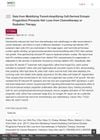Search
for
Sort by
Research
780-810 / 1000+ results
research Cannabinoids: Current and Future Options to Treat Chronic and Chemotherapy-Induced Neuropathic Pain
Cannabinoids may help treat chronic and chemotherapy-induced neuropathic pain, but more research is needed to confirm their effectiveness and safety.

research Skin Targeting of an Optimized Caffeine Nanostructured Lipid Carrier with Improved Efficiency Against Chemotherapy-Induced Alopecia
The optimized caffeine formula improved hair growth and penetrated all skin layers.

research Skin Targeting of an Optimized Caffeine Nanostructured Lipid Carrier With Improved Efficiency Against Chemotherapy-Induced Alopecia
The new caffeine cream works better for hair growth than existing products.

research Are All Adverse Effects Undesirable? A Case of Chemotherapy-Induced Adverse Effect - An Exception!
Excessive eyelash growth from erlotinib may indicate positive tumor response and help treat madarosis.
research Effect of Trigonella Foenum-Graecum Linn. (Seeds) and Butea Monosperma Lam. (Flowers) on Chemotherapy-Induced Alopecia
Fenugreek seeds and Butea monosperma flowers may help reduce hair loss from chemotherapy.

research Prevention of Doxorubicin-Induced Alopecia by Scalp Hypothermia: Relation to Degree of Cooling
Cooling the scalp below 22°C before and during chemotherapy can help prevent hair loss.
research Hydroxyl Radical Mediates Cisplatin-Induced Apoptosis in Human Hair Follicle Dermal Papilla Cells and Keratinocytes Through Bcl-2-Dependent Mechanism
Hydroxyl radicals cause hair follicle cell death during chemotherapy by reducing Bcl-2 protein levels.

research Minoxidil as a Prophylaxis of Doxorubicin-Induced Alopecia
Minoxidil not effective in preventing chemotherapy-induced hair loss.

research Treatment with ImuVert and N-Acetylcysteine Protects Rats from Cyclophosphamide and Cytarabine-Induced Alopecia
N-acetylcysteine and ImuVert can prevent hair loss in rats caused by chemotherapy.

research Annurca Apple Polyphenols Protect Murine Hair Follicles from Taxane-Induced Dystrophy and Redirect Polyunsaturated Fatty Acid Metabolism Toward β-Oxidation
Annurca apple extract may protect mouse hair from damage by chemotherapy and could help treat hair loss without promoting cancer growth.

research Protective Effect of Korean Red Ginseng Against Chemotherapeutic Drug-Induced Premature Catagen Development Assessed With Human Hair Follicle Organ Culture Model
Korean Red Ginseng may protect against hair loss caused by chemotherapy.

research A Medicinal and Edible Formula YH0618 Ameliorates the Toxicity Induced by Doxorubicin via Regulating the Expression of Bax/Bcl-2 and FOXO4
The formula YH0618 can reduce the harmful side effects of the chemotherapy drug Doxorubicin and protect healthy cells.

research Protection Against Cytosine Arabinoside-Induced Alopecia by Minoxidil in a Rat Animal Model
Minoxidil helps prevent hair loss from chemotherapy in rats.

research Chemoprevention of Doxorubicin-Induced Alopecia in Mice by Dietary Administration of L-Cystine and Vitamin B6
L-cystine and vitamin B6 at high doses prevented hair loss in mice treated with a chemotherapy drug.

research Epigallocatechin-3-Gallate Inhibits Paclitaxel-Induced Apoptosis Through the Alteration of MicroRNA Expression in Human Dermal Papilla Cells
Green tea extract helps prevent cell death and supports cell survival in hair cells exposed to a chemotherapy drug.

research Mechanisms Underlying Select Chemotherapeutic-Agent-Induced Neuroinflammation and Subsequent Neurodegeneration
Chemotherapy can cause brain inflammation and damage, and understanding this process could help manage side effects.

research The Effect of Active Hexose Correlated Compound in Modulating Cytosine Arabinoside-Induced Hair Loss, and 6-Mercaptopurine- and Methotrexate-Induced Liver Injury in Rodents
AHCC reduces hair loss and liver injury caused by chemotherapy in rodents.
research Dissecting the Impact of Chemotherapy on the Human Hair Follicle
Chemotherapy damages hair follicles, causing hair loss and other cellular changes.
research Efficacy of Penguin Cap as Scalp Cooling System for Prevention of Alopecia in Patients Undergoing Chemotherapy
The penguin cap can help reduce hair loss in chemotherapy patients.
research Cardioprotective Effect of Royal Jelly on Paclitaxel-Induced Cardiotoxicity in Rats
Royal jelly can protect the heart from damage caused by paclitaxel.
research Results of Scalp Cooling During Anthracycline-Containing Chemotherapy Depend on Scalp Skin Temperature
Cooler scalp temperatures during chemotherapy may prevent hair loss.

research Complex Changes in the Apoptotic and Cell Differentiation Programs During Initiation of the Hair Follicle Response to Chemotherapy
Chemotherapy causes complex changes in hair follicle cells that can lead to hair loss.
research A Study on the Effect of the Leaf Essential Oil of Ocimum Gratissimum Linn. on Cyclophosphamide-Induced Hair Loss
Ocimum oil may promote hair growth and reduce hair loss from cyclophosphamide.
research No Prevention of Radiotherapy-Induced Alopecia by Scalp Cooling
Scalp cooling does not stop hair loss from radiotherapy.
research Comments Regarding Hair Regrowth During Chemotherapy After Scalp Cooling Technique
Scalp cooling can help reduce hair loss during chemotherapy.

research Scalp Cooling in the Prevention of Anthracycline-Induced Alopecia
Scalp cooling prevented hair loss in half of the patients, despite significant side effects.

research Mobilizing Transit-Amplifying Cell-Derived Ectopic Progenitors Prevents Hair Loss from Chemotherapy or Radiation Therapy
Activating certain hair follicle cells could prevent hair loss from cancer treatments.
research Efficacy of Low-Dose Oral Minoxidil in the Management of Anticancer Therapy-Induced Alopecia in Patients With Breast Cancer: A Retrospective Cohort Study
Low-dose oral minoxidil combined with topical minoxidil improves hair growth in breast cancer patients with therapy-induced hair loss.

research Scalp Cooling for the Prevention of Chemotherapy-Induced Alopecia: Descriptive Study
Scalp cooling effectively prevents chemotherapy-induced hair loss but requires better pain management.